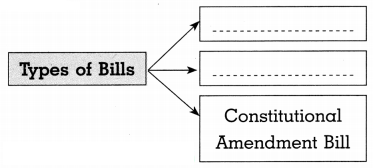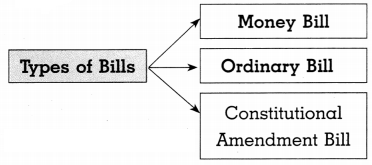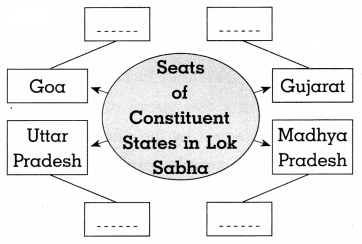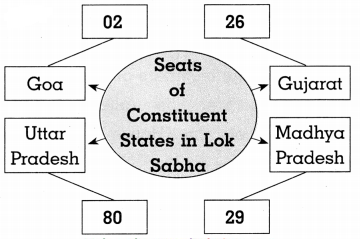Balbharti Maharashtra State Board Class 8 Civics Solutions Chapter 2 The Indian Parliament Notes, Textbook Exercise Important Questions and Answers.
Class 8 Civics Chapter 2 The Indian Parliament Questions And Answers Maharashtra Board
The Indian Parliament Class 8 Questions And Answers Chapter 2 Maharashtra Board
Class 8 Civics Chapter 2 The Indian Parliament System Textbook Questions and Answers
1. Complete the following sentences by choosing the correct option.
Question 1.
Candidates to the Lok Sabha are elected through ……….. .
(a) Territorial constituencies
(b) Religious constituencies
(c) Local bodies
(d) Proportional Representation System
Answer:
(a) Territorial constituencies

Question 2.
The ………….. of India is the ex-officio chairman of the Rajya Sabha.
(a) President
(b) Vice-President
(c) Prime Minister
(d) Chief Justice
Answer:
(b) Vice-President
2. Find and write.
Question 1.
Members of Lok Sabha and Rajya Sabha are known as ……………….. .
Answer:
Members of Parliament (MPs)
Question 2.
The responsibility of making laws is with the ……………… .
Answer:
Parliament
3. Explain the following statements with reasons:
Question 1.
Rajya Sabha is a permanent House.
Answer:
- The tenure of the members of Rajya Sabha does not get over at the same time.
- 1/3rd of the total membership of Rajya Sabha retire after every two years and equal number of new members get elected.
-
Because the limited members of Rajys Sabha retire step by step, it can function continuously.
Since Rajya Sabha is never dissolved completely it is called a permanent House.

Question 2.
Lok Sabha is known as the first House.
Answer:
- Lok Sabha is the lower and the first House of the Parliament of India.
- Lok Sabha is the House of Representatives directly elected by the people. Hence, Lok Sabha is known as the first House.
4. Answer the following in 25 to 30 words:
Question 1.
How are members of the Lok Sabha elected?
Answer:
- As per the Constitution, there can be a maximum of 552 members in Lok Sabha.
- General elections to Lok Sabha are held after every five years and members are directly elected by the people.
- To ensure equal representation to all sections of the community, some seats are reserved for members belonging to Scheduled Castes and Scheduled Tribes.
- In case there are no representation from the Anglo-Indian community, the President can appoint two members from this community to the Lok Sabha.
- Thus, Lok Sabha is the representative body of the citizens of India.

Question 2.
Explain the functions of the Speaker of Lok Sabha.
Answer:
The functions of the Speaker of Lok Sabha are :
- To conduct the business of the House in an unbiased manner.
- To take care of the rights and privileges of the members of Lok Sabha.
- To interpret the rules of daily functioning of the House and work accordingly.
- To maintain the decorum and dignity of the House.
5. Explain the step involved in the lawmaking process.
Question 1.
Parliament :
Answer:
- The Legislature at the national level is called the Parliament.
- It consists of the President and two houses, i.e., the Lok Sabha and the Rajya Sabha.
- Though the President is an inseparable part of the Parliament, he/she cannot participate in the discussions in either of the Houses of the Parliament.
- The Constitution of India has created the Parliament.
Question 2.
Amendment to the Constitution :
Answer:
- According to the changing times, certain necessary changes have to be made in some laws. The process of making such changes is called Amendment.
- Only the Parliament has the right to make such amendments to the Constitution.
- The Constitution amendment bill is considered to be an important bill.
- The Parliament discusses why the amendment is required and decides whether to accept it or not.

Question 3.
Members of Parliament :
Answer:
- The members of Lok Sabha and Rajya Sabha are known as Members of Parliament (MPs).
- The members of Lok Sabha are directly elected by the people.
- The members of Rajya Sabha are elected from the constituent States and Union Territories.
- MPs try to resolve the queries and complaints of their constituencies by raising questions in the Parliament.
- MPs also participate in the process of formulation of laws.
- The Government allocates funds to MPs to carry out development activities in their constituencies.
Question 4.
Bill of Law:
Answer:
- At the initial stage of lawmaking process, a rough draft of the law is prepared.
- This rough draft or outline is known as ‘draft proposal of the law’ or ‘bill of law’.
- The Bill clearly mentions the objectives and the details of the proposed law.
- Every bill has to undergo three readings in both the Houses, and then it is put to vote.
Can you find out?
For the purpose of elections, the State is divided into territorial constituencies. The constituent States in India get seats on the basis of their population. For e.g.
- Maharashtra – 48 seats
- Gujarat – 26 seats
- Madhya Pradesh – 29 seats
- Goa – 02 seats
- Uttar Pradesh – 80 seats

Understand It:
(The gist of the conversation held between Mazy, Radhika, Ran veer and others.)
- Any Indian citizen who has completed 18 years of age is only eligible to vote.
- An Indian citizens who has completed 25 years of age can contest for Lok Sabha election.
- A citizen of India can contest for election from any constituency of any State.
- Citizens of other countries cannot contest for elections of Lok Sabha and Rajya Sabha.
- Just as there are set criteria for qualifying for election, there are set criteria for disqualification as well.
Rights regarding passing of Bills:
- Though Lok Sabha and Rajya Sabha have same set of rights, Lok Sabha has certain rights which are not available for Rajya Sabha.
- Bills related to finance (Money Bills) and such other bills are first introduced and passed in Lok Sabha.
- Rajya Sabha has limited powers with respect to money bills.
- Rajya Sabha can pass a resolution on the subject in the State List.
Can you tell?
Certain laws which become out-of-date (obsolete) are abolished. Can you give examples of such obsolete laws? For example, Privy purses.
Know this too:
- Every year, on 1 February the Union Finance Minister presents the national budget to the Lok Sabha. Previously, it was presented on 28 February.
- The State Legislatures also follow the same procedure of law making as in the Parliament.
- The bill passed can become a law only after it is signed by the President at the Union level and by the Governor at the State level.

Project:
The President nominates 12 members to the Rajya Sabha. Collect information on what are the criteria for their selection.
Class 8 Civics Chapter 2 The Indian Parliament Additional Important Questions and Answers
Complete the following sentences by choosing the correct option:
Question 1.
…………….. is the upper House of the Parliament.
(a) Legislative Assembly
(b) Lok Sabha
(c) Rajya Sabha
(d) Legislative Council
Answer:
(c) Rajya Sabha
Question 2.
The …………… of India has created the Parliament of India.
(a) Legislature
(b) Executive
(c) Constitution
(d) British Law
Answer:
(c) Constitution

Question 3.
1/3rd members of total membership of Rajya Sabha, who have completed their tenure of six years, retire after every ……………….. years.
(a) two
(b) four
(c) five
(d) six
Answer:
(a) two
Question 4.
If ……………….. feels that the Parliament should make a law of the subject in the state list, it can pass a resolution to that effect.
(a) Lok Sabha
(b) Rajya Sabha
(c) Executive
(d) President
Answer:
(b) Rajya Sabha
Question 5.
Every year in the month of February, the ………….. presents the national budget to the Lok Sabha.
(a) Prime Minister
(b) President
(c) Finance Minister
(d) Speaker
Answer:
(c) Finance Minister
Question 6.
The President appoints ……………….. distinguished personalities to the Rajya Sabha.
(a) two
(b) eight
(c) fifteen
(d) twelve
Answer:
(d) twelve

Find and write:
Question 1.
……………. represent the Lok Sabha.
Answer:
The Speaker
Question 2.
The bill passed by the State legislature becomes a law after it is signed by the ………….. .
Answer:
Governor
Question 3.
The House that gives representation to 29 States and 7 Union Territories is ………………. .
Answer:
Rajya Sabha
Complete the following Concept maps:
Question 1.

Answer:

Question 2.

Answer:

Question 3.

Answer:

Write short notes on:
Question 1.
The Chairman of Rajya Sabha :
Answer:
- The Vice-President of India is the ex-officio Chairman of Rajya Sabha.
- He exercises a control over the functioning of Rajya Sabha.
- Maintaining discipline in the House is the function of the Chairman of Rajya Sabha.
- He also has the responsibility of facilitating discussions in the House by giving members a chance to speak, etc.

Question 2.
Speaker of Lok Sabha :
Answer:
- The speaker is elected in the very first meeting after the election of Lok Sabha.
- The members of Lok Sabha elect one member among them as the Speaker.
- Lok Sabha functions under the guidance and control of the Speaker.
- It is the responsibility of the speaker to conduct the business of the House in an unbiased manner.
- The Speaker has to maintain decorum and dignity of the House.
- Moreover, he has to interpret the rules and work accordingly.
Question 3.
Control over Council of Ministers :
Answer:
- Council of Ministers are drawn from the Parliament and hence Parliament exercises control over them.
- The members of Parliament exercise this control through multiple ways.
- It is the responsibility of the Parliament to see that the Council of Ministers does not disregard the Parliament.
- In case the Lok Sabha passes a no-confidence motion against the Council of Ministers, it has to resign.
Answer the following in 25 to 30 words :
Question 1.
Write about Lok Sabha elections.
Answer:
- Since Lok Sabha is a House of people’s representatives, elections are held after every five years.
- Elections to Lok Sabha which are held every five years are known as General elections.
- When Lok Sabha is dissolved before the completion of five years and elections are held, such elections are called mid- term elections.
- When a member resigns or dies suddenly, election held for such a seat is called by-election.
Question 2.
Explain the composition of Rajya Sabha.
Answer:
The composition of Rajya Sabha is as follows :
- The total membership of Rajya Sabha is 250 members.
- Amongst them, 238 members are elected from the constituent states and Union Territories.
- Remaining twelve members, who are distinguished personalities from the fields of literature, arts, science, sports and social work, are appointed by the President.
- The members of Rajya Sabha are elected through the system of proportional representation.

Question 3.
Explain the functions of the Parliament.
Answer:
In order to achieve welfare of the people and the objectives of the 8 Constitution, the Parliament has to perform 8 following functions :
- To formulate new laws and to repeal the outdated laws.
- To make necessary changes in the existing laws.
- To amend the Constitution wherever necessary.
- To keep control over Council of Ministers.
Question 4.
Mention the ways of amending the Constitution.
Answer:
The Constitution can be amended in following ways :
- Few provisions in the Indian Constitution can be amended by simple majority.
- Some provisions require special (2/3rd) majority of the Parliament.
- Few other provisions can be amended by special majority plus consent from more than half of the constituent states.
Explain the following statements with reasons:
Question 1.
Though Lok Sabha is the Lower House, it is more powerful than Rajya Sabha.
Answer:
- Since members of Lok Sabha are directly elected by the people, it represents the people of the nation in the true sense.
- Money bills related to financial matters are presented in Lok Sabha. Rajya Sabha has very limited powers with respect to Money Bills.
- Since the total membership of Lok Sabha is more than Rajya Sabha, it always gets an upper hand when decisions are taken in the joint meeting of both the Houses.
- Only Lok Sabha can pass a no-confidence motion against the Council of Ministers.
Hence, though Lok Sabha is the lower House, it is more powerful than Rajya Sabha.

Answer the following questions in details:
Question 1.
Explain the steps involved in the law-making process.
Answer:
The Bill undergoes following process in order to be converted into a Law (Act).
1. First reading :
- The minister of the concerned department/ministry or member of the Parliament presents the bill in the House.
- The objectives and the structure of the Bill are mentioned.
2. Second reading :
- The positive and negative points of the bill are discussed.
- The defects and faults in the bill are stressed.
- After removing the defects and the faults, the bill is put to vote.
3. Committee Stage :
- Sometimes, if required, the Bill is sent to the committee of the House.
- The Bill is discussed in the Committee in details.
- The Committee report consisting of instructions and recommendations is sent to the House.
- The Bill is discussed clause by clause and then voting is taken.
4. Third reading :
- The Bill is once again discussed in the House.
- Voting is taken for approving the Bill.
5. Approval of the other House :
- The Bill has to undergo the same procedure even in the other House.
- The Bill is approved by majority.
6. Assent by the President :
- After getting an approval from both the Houses, the Bill is further sent for assent by the President.
- After the final assent and signature of the President, the Bill is converted into Law.

Question 2.
Distinguish between Lok Sabha and Rajya Sabha on the basis of following points:
1. Number of members
2. Age limit
3. Election
4. Tenure
Answer:
| Points | Lok Sabha | Rajya Sabha |
| 1. Number of members | Maximum 552 members | Total 250 members. |
| 2. Age limit | 25 years | 30 years |
| 3. Election | Directly elected by the people | 238 members elected from the constituent states and Union Territories. 12 members appointed by the President. |
| 4. Tenure | 5 years | Permanent House. Tenure of every member is 6 years. |
Question 3.
Why, according to you, the Constitution must have granted the President, the right to appoint twelve members to the Rajya Sabha?
Answer:
1. The President appoints twelve members to the Rajya Sabha. These members are usually experienced and distinguished personalities from the fields of literature, arts, science, sports and social service.
2. Such personalities are very active and totally devoted to their respective fields. Hence, they have no time for contesting the elections.
3. They keep themselves away from election procedures like campaigning, conducting meetings, etc. So their election to the Parliament is not possible.
4. But, to derive benefit from their profound knowledge and experience for making of laws, their presence in the Parliament is essential.
Therefore, I feel that the Constitution has granted the President, the right to appoint twelve members to the Rajya Sabha.